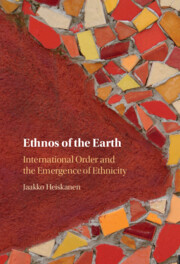2 - Race
Published online by Cambridge University Press: 12 December 2024
Summary
This chapter demonstrates how the emergence of ethnicity led to the ‘domestication’ of race. During the nineteenth century, ‘race’ was an incredibly malleable term that could be used to describe both vast transnational populations differentiated by physical characteristics and smaller national communities such as the French or the Jews. With the emergence of a sharper divide between the biological and sociocultural spheres in the early twentieth century, this polyvalence came to be seen as a problem. To specify the meaning of race with greater precision, a cluster of new ethnos-based terms (ethnic group, ethnicity, ethnie, ethnos) was coined around the turn of the century. One important consequence of this conceptual shift was the effacement of the transnational stratum of race: there is no global ethnic line comparable to the global colour line. The chapter concludes with a discussion of how a pluralised concept of civilisation has filled in for the suppressed transnational stratum of race.
Keywords
- Type
- Chapter
- Information
- Ethnos of the EarthInternational Order and the Emergence of Ethnicity, pp. 79 - 164Publisher: Cambridge University PressPrint publication year: 2024

